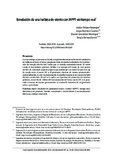Mostrar el registro sencillo del ítem
Machine-Learning-Assisted Transmission Power Control for LoRaWAN Considering Environments with High Signal-to-Noise Variation
| dc.contributor.author | Gonzalez-Palacio M | |
| dc.contributor.author | Tobon-Vallejo D | |
| dc.contributor.author | Sepulveda-Cano L.M | |
| dc.contributor.author | Luna-delRisco M | |
| dc.contributor.author | Roehrig C | |
| dc.contributor.author | Le L.B. | |
| dc.date.accessioned | 2024-07-31T21:07:00Z | |
| dc.date.available | 2024-07-31T21:07:00Z | |
| dc.date.created | 2024 | |
| dc.identifier.issn | 21693536 | |
| dc.identifier.uri | http://hdl.handle.net/11407/8442 | |
| dc.description | To achieve an adequate tradeoff between range and energy efficiency, LoRaWAN End Nodes (ENs) choose their transmission parameters using an Adaptive Data Rate (ADR) scheme based on the maximum value of previous Signal-to-Noise (<italic>SNR</italic>) values. However, the ADR only performs well in favorable channel conditions. In fact, if the <italic>SNR</italic> exhibits high variability, these parameters could be inefficiently set and may negatively affect the Packet Delivery Rate (PDR). Therefore, a link margin could be overestimated to improve the PDR by the ADR algorithm, which may, however, waste the EN’s energy. This paper proposes a novel ADR that does not rely on the past <italic>SNR</italic> values. Still, our proposed design directly predicts the current <italic>SNR</italic> and transmission parameters using Machine Learning. Specifically, the underlying Machine Learning models were trained using in-field measurements for six months in Medellín, Colombia, including different environmental variables and their effects on the <italic>SNR</italic>. Our ADR scheme improved energy consumption by 47.1% with a PDR of 99% and reduced collisions in dense networks up to 9.5% compared with the ADR scheme. Furthermore, we show that our proposed design outperforms some enhanced versions of the ADR scheme proposed in the literature in both energy consumption and collision rate. Finally, our proposed framework enables simple implementation since it runs directly in the ENs, improving the response time compared with the traditional ADR scheme. Authors | |
| dc.language.iso | eng | |
| dc.publisher | Institute of Electrical and Electronics engineers Inc. | |
| dc.relation.isversionof | https://www.scopus.com/inward/record.uri?eid=2-s2.0-85190347221&doi=10.1109%2fACCESS.2024.3387457&partnerID=40&md5=4d2f4987e00ce468badb50467859c5e5 | |
| dc.source | IEEE Access | |
| dc.source | IEEE Access | |
| dc.source | Scopus | |
| dc.subject | Adaptative Data Rate | eng |
| dc.subject | Convergence | eng |
| dc.subject | Energy consumption | eng |
| dc.subject | Heuristic algorithms | eng |
| dc.subject | Internet of Things | eng |
| dc.subject | LoRaWAN | eng |
| dc.subject | Machine Learning | eng |
| dc.subject | Power control | eng |
| dc.subject | Reinforcement learning | eng |
| dc.subject | Signal to noise ratio | eng |
| dc.subject | Transmission Power Control | eng |
| dc.subject | Energy efficiency | eng |
| dc.subject | Heuristic algorithms | eng |
| dc.subject | Internet of things | eng |
| dc.subject | Power control | eng |
| dc.subject | Reinforcement learning | eng |
| dc.subject | Signal to noise ratio | eng |
| dc.subject | Adaptative data rate | eng |
| dc.subject | Convergence | eng |
| dc.subject | Data-rate | eng |
| dc.subject | Energy-consumption | eng |
| dc.subject | Heuristics algorithm | eng |
| dc.subject | LoRaWAN | eng |
| dc.subject | Machine-learning | eng |
| dc.subject | Power-control | eng |
| dc.subject | Reinforcement learnings | eng |
| dc.subject | Transmission power control | eng |
| dc.subject | Energy utilization | eng |
| dc.title | Machine-Learning-Assisted Transmission Power Control for LoRaWAN Considering Environments with High Signal-to-Noise Variation | eng |
| dc.type | article | |
| dc.rights.accessrights | info:eu-repo/semantics/restrictedAccess | |
| dc.publisher.program | Ingeniería de Telecomunicaciones | spa |
| dc.publisher.program | Ingeniería en Energía | spa |
| dc.type.spa | Artículo | |
| dc.identifier.doi | 10.1109/ACCESS.2024.3387457 | |
| dc.relation.citationstartpage | 1 | |
| dc.relation.citationendpage | 1 | |
| dc.publisher.faculty | Facultad de Ingenierías | spa |
| dc.affiliation | Gonzalez-Palacio, M., Universidad de Medellín, Medellín, Antioquia, Colombia | |
| dc.affiliation | Tobon-Vallejo, D., Universidad de Antioquia, Medellín, Antioquia, Colombia | |
| dc.affiliation | Sepulveda-Cano, L.M., Universidad EAFIT, Medellín, Antioquia, Colombia | |
| dc.affiliation | Luna-delRisco, M., Universidad de Medellín, Medellín, Antioquia, Colombia | |
| dc.affiliation | Roehrig, C., Fachhochschule Dortmund, University of Applied Sciences and Arts, Dortmund, Germany | |
| dc.affiliation | Le, L.B., Institut National de la Recherche Scientifique, Montreal, QC, Canada | |
| dc.type.version | info:eu-repo/semantics/publishedVersion | |
| dc.identifier.reponame | reponame:Repositorio Institucional Universidad de Medellín | |
| dc.identifier.repourl | repourl:https://repository.udem.edu.co/ | |
| dc.identifier.instname | instname:Universidad de Medellín |
Ficheros en el ítem
| Ficheros | Tamaño | Formato | Ver |
|---|---|---|---|
|
No hay ficheros asociados a este ítem. |
|||
Este ítem aparece en la(s) siguiente(s) colección(ones)
-
Indexados Scopus [1813]


